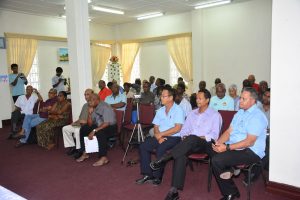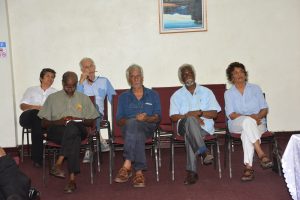Economists outline strategies that could better develop Guyana’s economy – urge new Government to practise good governance
GUYANESE economists have outlined strategies which the newly elected Government could employ to better develop Guyana’s economy, which of course also comes with good governance and participation of each stakeholder.This was touted on Thursday at a symposium held in the conference room of the National Library by the Working People’s Alliance (WPA) on “The Political and Economic Challenges ahead for Guyana.” The symposium was held to commemmorate the 35th Anniversary of the assassination of world-renowned scholar, political activist and founding party member, Dr. Walter Rodney.
During the discussions, Professor Clive Thomas, Dr. Maurice Odle, Dr. Rishi Thakur and Dr. Turhane Doerga made reference to the failures of the past Government to implement certain economic practices which would have helped Guyana to be in a better economic position today.
Some of the topics discussed were improvement of the rice and sugar industries; plans to tackle poverty; and diversifying the economy by moving away from traditional economic activities such as rice and sugar production, mining and so forth.
Speaking to the gathering, newly appointed Presidential Advisor for Sustainable Development and popular economist, Dr. Clive Thomas, said the change of Government comes at a “pivotal time when yes, there are innumerable political [and] economic challenges, but every challenge brings an opportunity.”
Further disclosing that there are five ways in which the coalition Government can go about developing the country, Prof Thomas said these include, coalition management, the need to diversify the economy, financing for development, tackling poverty and tackling political disruption.
Zeroing in on coalition management, Prof Thomas stated that though the coalesced parties may have two different ideologies-which in some cases may cause a coalition to fall apart-they must work closely together in order to execute their functions as the government.
That apart, he elaborated on the fact that earnings generated from the various economic activities should be directed towards diversification of the economy, instead of injecting them into ventures that would not prove to be fruitful in any way.
RICE AND SUGAR
Focusing on the agricultural sector, the professor noted that $15B each would be needed for the rice and sugar industries in order to prevent the their collapse. “The Government has to ensure that their 100-day plan is met, and do their best to meet the constituencies of rice and sugar.”
Elaborating more on the ways in which the rice and sugar industries could be developed, Dr Thomas noted that the sugar industry, like the rice industry, has to be privatised in order for it to function better, because it was wrong of the previous administration not to do so.
“The private sector should be pushing the economy while the Government of the day should be handling regulations and governing the country,” he said.
With reference to new markets for rice and sugar, Dr Thomas said that Government must open the country by bridging the Corentyne River, which will link Guyana and Suriname, and the Takutu River, which will Link Guyana and Brazil, thereby building better relationships among the neighbouring countries.
Therefore, they must find markets and get going in order to contribute to the total re-development of the country.
Dr. Thomas also added that these two main agricultural industries are needed if the country is to go forward, because they are two of the main sources of income for the Government. “Although there is a small window of opportunity for us, we must take it and develop the industries.”
MILLENNIUM DEVELOPMENT GOALS
Meanwhile, moving away from the agricultural sector, Dr Maurice Odle outlined that the Government will now be aided by the United Nation (UN) 17 Millennium Development Goals (MDGs, which will be endorsed by the International Community on September 17, 2015).
Some of the targets which are included in the MDGs include, ending poverty, ending hunger, ensuring healthy lives, ensuring there is proper education, gender equality, which are to be achieved before 2030.
These, he stated, are some of the guidelines which the Government should follow in order to put Guyana in a positive position as it relates to the economy.
Also, “Guyana now has a possibility of changing our economy, setting our sights high to achieve a different set of expectations ,as our economy has only developed between 3-5% within the last four years, and from 2000-2015 the overall development rate was 2%… while there were 19 countries in 2000 that were able to achieve a 7% growth rate and in the coming years, Guyana should join those countries,” he said.





